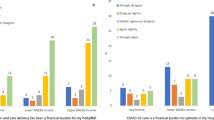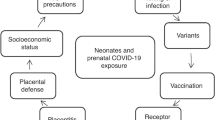Abstract
Background
The COVID-19 pandemic threatens global newborn health. We describe the current state of national and local protocols for managing neonates born to SARS-CoV-2-positive mothers.
Methods
Care providers from neonatal intensive care units on six continents exchanged and compared protocols on the management of neonates born to SARS-CoV-2-positive mothers. Data collection was between March 14 and 21, 2020. We focused on central protocol components, including triaging, hygiene precautions, management at delivery, feeding protocols, and visiting policies.
Results
Data from 20 countries were available. Disease burden varied between countries at the time of analysis. In most countries, asymptomatic infants were allowed to stay with the mother and breastfeed with hygiene precautions. We detected discrepancies between national guidance in particular regarding triaging, use of personal protection equipment, viral testing, and visitor policies. Local protocols deviated from national guidance.
Conclusions
At the start of the pandemic, lack of evidence-based guidance on the management of neonates born to SARS-CoV-2-positive mothers has led to ad hoc creation of national and local guidance. Compliance between collaborators to share and discuss protocols was excellent and may lead to more consensus on management, but future guidance should be built on high-level evidence, rather than expert consensus.
Impact
-
At the rapid onset of the COVID19 pandemic, all countries presented protocols in place for managing infants at risk of COVID19, with a certain degree of variations among regions.
-
A detailed review of ad hoc guidelines is presented, similarities and differences are highlighted.
-
We provide a broad overview of currently applied recommendations highlighting the need for international context-relevant coordination.
Similar content being viewed by others
Log in or create a free account to read this content
Gain free access to this article, as well as selected content from this journal and more on nature.com
or
References
WHO. Coronavirus 2019/events as they happened. https://www.who.int/emergencies/diseases/novel-cor (2020)
Fahmi, I. #Covid19 coronavirus disease 2019. DroneEmprit. https://pers.droneemprit.id/covid19/ (2020)
Sun, P., Lu, X., Xu, C., Sun, W. & Pan, B. Understanding of COVID-19 based on current evidence. J. Med. Virol. https://doi.org/10.1002/jmv.25722 (2020).
Dong, Y. et al. Epidemiological characteristics of 2143 pediatric patients with 2019 coronavirus disease in China. Pediatrics e20200702 (2020).
Dong, L. et al. Possible vertical transmission of SARS-CoV-2 from an infected mother to her newborn. JAMA 323, 1846–1848 (2020).
Zimmerman, P. & Curtis, N. Coronavirus infections in children including COVID-19: an overview of the epidemiology, clinical features, diagnosis, treatment and prevention options in children. Pediatr. Infect. Dis. J. 39, 355–368 (2020).
Schwartz, D. A. An analysis of 38 pregnant women with COVID-19, their newborn infants, and maternal-fetal transmission of SARS-CoV-2: maternal coronavirus infections and pregnancy outcomes. Arch. Pathol. Lab. Med. https://doi.org/10.5858/arpa.2020-0901-SA (2020).
Zeng, L. et al. Neonatal early-onset infection with SARS-CoV-2 in 33 neonates born to mothers with COVID-19 in Wuhan, China. JAMA Pediatr. 23, E1–E3 (2020).
Chen, Y. et al. Infants born to mothers with a new coronavirus (COVID-19). Front. Pediatr. 8, 1–5 (2020).
Kimberlin, D. & Stagno, S. Can SARS-CoV-2 infection be acquired in utero? More definitive evidence is needed. JAMA https://doi.org/10.1001/jama.2020.4868 (2020).
Ioannidis, J. A fiasco in the making? As the coronavirus pandemic takes hold, we are making decisions without reliable data. https://www.statnews.com/2020/03/17/a-fiasco-in-the-making-as-the-coronavirus-pandemic-takes-hold-we-are-making-decisions-without-reliable-data/ (2020).
WHO. Clinical management of severe acute respiratory infection (SARI) when COVID-19 disease is suspected. https://www.who.int/publications-detail/clinical-management-of-severe-acute-respiratory-infection-when-novel-coronavirus-(ncov)-infection-is-suspected (2020).
Chen, H. et al. Clinical characteristics and intrauterine vertical transmission potential of COVID-19 infection in nine pregnant women: a retrospective review of medical records. Lancet 395, 809–815 (2020).
Zhu, H. et al. Clinical analysis of 10 neonates born to mothers with 2019-nCoV pneumonia. Transl. Pediatr. 1, 51–60 (2020).
Lu, Q. & Shi, Y. Coronavirus disease (COVID-19) and neonate: what neonatologist need to know. J. Med. Virol. https://doi.org/10.1002/jmv.25740 (2020).
Royal College of Obstetricians & Gynecologists. Coronavirus (COVID-19) infection in pregnancy. https://www.rcog.org.uk/en/guidelines-research-services/guidelines/coronavirus-pregnancy/covid-19-virus-infection-and-pregnancy/ (2020).
Li, F., Feng, Z. C. & Shi, Y. Proposal for prevention and control of the 2019 novel coronavirus disease in newborn infants. Arch. Dis. Child. Fetal Neonatal Ed. https://doi.org/10.1136/archdischild-2020-318996 (2020).
CDC. Pregnancy & breastfeeding information about coronavirus disease 2019. https://www.cdc.gov/coronavirus/2019-ncov/need-extra-precautions/pregnancy-breastfeeding.html (2020).
AAP Committee on Infectious Diseases. Red Book (2018): Report of the Committee on Infectious Diseases 31st edn. (American Academy of Pediatrics, 2018).
Health Policy Team - RCPCH. COVID-19 - guidance for paediatric services. https://www.rcpch.ac.uk/resources/covid-19-guidance-paediatric-services (2020).
Zhang, Z. et al. Protecting healthcare personnel from 2019-nCoV infection risks: lessons and suggestions. Front. Med. 14, 229–231 (2020).
WHO. Influenza - public health preparedness. https://www.who.int/influenza/preparedness/en/ (2019).
Trevisanuto, D. et al. Neonatal resuscitation where the mother has a suspected or confirmed novel coronavirus (SARS-CoV-2) infection: suggestion for a pragmatic action plan. Neonatology https://doi.org/10.1159/000507935 (2020).
Acknowledgements
In memory of our friends Enrico R. and Nicoletta M., and to all the victims of SARS-CoV-19, whose death represents an immeasurable loss for our world community; to their families; to our friends Marco Mantero, Luisa Napolitano, Francesca Orsenigo, and all our colleagues who fight on the frontline against the COVID-19 pandemic; to everybody who is joining our fight with their own means, at work or at home: they inspired us to join efforts for this collaborative neonatology project.
Author information
Authors and Affiliations
Consortia
Contributions
A.L., C.K., J.P., J.A.F.Z., and C.C.R. developed the initial research question. All authors contributed in identifying knowledge resources and completing information on local and national guidance. A.L., together with C.K., J.P., J.A.F.Z., E.J.M., and C.C.R., produced the first draft of the manuscript. A.S.D. and F.M. contributed to concluding the analysis and manuscript. All collaborators were included on the completion of the manuscript.
Corresponding author
Ethics declarations
Competing interests
The authors declare no competing interests.
Informed Consent
Patient consent was not required.
Additional information
Publisher’s note Springer Nature remains neutral with regard to jurisdictional claims in published maps and institutional affiliations.
A full list of Consortium members and their affiliations appears at the end of the paper
Supplementary information
Rights and permissions
About this article
Cite this article
Lavizzari, A., Klingenberg, C., Profit, J. et al. International comparison of guidelines for managing neonates at the early phase of the SARS-CoV-2 pandemic. Pediatr Res 89, 940–951 (2021). https://doi.org/10.1038/s41390-020-0976-5
Received:
Revised:
Accepted:
Published:
Issue date:
DOI: https://doi.org/10.1038/s41390-020-0976-5
This article is cited by
-
Management of neonates with maternal prenatal coronavirus infection and influencing factors
Pediatric Research (2024)
-
Differences in clinical characteristics of early-onset and late-onset severe acute respiratory syndrome coronavirus 2 infections in neonates
European Journal of Pediatrics (2024)
-
Multisystem inflammatory syndrome in children (MIS-C) and neonates (MIS-N) associated with COVID-19: optimizing definition and management
Pediatric Research (2023)
-
Pediatric Research and COVID-19: the changed landscape
Pediatric Research (2022)
-
Neonates and COVID-19: state of the art
Pediatric Research (2022)



